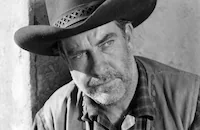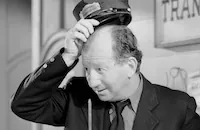Sinner's Holiday

Brief Synopsis
Cast & Crew
John G. Adolfi
Grant Withers
Evelyn Knapp
James Cagney
Lucille La Verne
Noel Madison
Film Details
Technical Specs

Synopsis
Ma Delano and her family--Jennie, Joe, and Harry--operate a penny arcade on an amusement pier over which Mitch, a bootlegger doubling as a sideshow operator, wields an influential hand. Angel Harrigan, a barker who works for Mitch, incurs his wrath when he thwarts Mitch's flirtation with Jennie. Harry, the youngest of the family, becomes involved in Mitch's bootlegging operation, and when his superior is picked up on suspicion by the police, Harry takes over the speakeasy business and with Feretti, the bartender, pockets the proceeds. Mitch is unexpectedly released and, discovering Harry's treachery, plans to "get" him, but in their encounter on the darkened pier, Harry shoots him. Harry confesses to his mother, and when she replaces the gun in Angel's valise, suspicion falls on the barker. But Jennie, who witnessed the shooting, breaks down and describes the murder, accusing her brother, who confesses.

Director

John G. Adolfi
Cast

Grant Withers

Evelyn Knapp

James Cagney

Lucille La Verne
Noel Madison
Otto Hoffman

Warren Hymer
Ray Gallagher

Joan Blondell

Hank Mann
Purnell B. Pratt
Crew

Film Details
Technical Specs

Articles
Sinner's Holiday
Sinners' Holiday was based upon Marie Baumer's play "Penny Arcade," which starred then unknowns Joan Blondell as Harry's girlfriend Myrtle and James Cagney from the 1929 stage production. Al Jolson so admired the play he bought the screen rights for $20,000 and sold the rights to Warner Bros., stipulating that Cagney and Blondell be involved.
Author Patrick McGilligan noted in his biography of Cagney that in Sinners' Holiday, "Cagney delivered the immaculate vision of overgrown juvenile delinquency." Despite his sniveling mama's boy, Cagney did draw the line at too much mother-love, refusing to speak the line "I'm your baby, aren't I?"
The film was not well received by critics, though both Cagney and Blondell were praised for their performances. "Although the action involves liquor-running and murder, it is less a picture of action than of character, made so by the skill of Lucille La Verne and James Cagney," noted Time magazine.
"The most impressive acting is done by James Cagney" said The New York Times continuing, "his fretful tenseness during the closing scenes is conveyed with sincerity." The Exhibitor's Herald-World was equally effusive where Cagney was concerned, "It is the type of part which can be spoiled by the slightest shade of over-acting, but Cagney carries his characterization in each sequence just far enough."
Filmed in just three weeks, the quickie production Sinners' Holiday was Cagney's first movie role and featured some of the conventions that would come to define Cagney's on-screen roles as a mother worshipping violent criminal. He would follow the film up with another turn as a bootlegger in Warner's The Doorway to Hell (1930).
He noted of Sinners' Holiday in Cagney by Cagney, "With my pale New York complexion, which has no pigment except for my freckles, I looked like a wraith...So they had to pile the makeup on me, almost making me Indian red. One day I was standing without makeup behind Grant [Withers] as he was playing poker between shots. He looked up at me, did a triple-take, and finally realized who I was. 'Holy geeze' he said, 'get a load of him without any eyebrows.'"
Blondell and Cagney went on to highly successful careers as working class types. Blondell was often the tough-talking blonde with a heart of gold appearing in as many as 10 films a year as a Warners contract player in the Thirties. Undoubtedly due to his compact, scrappy frame and Lower East Side upbringing, Cagney also specialized in tough guy characters in many social issue dramas and gangster films.
After Sinners' Holiday Darryl Zanuck and Jack Warner saw the value of Cagney to the company and extended his contract, eventually signing him to Warner Bros. There, Cagney sealed his reputation as an actor of great renown with The Public Enemy (1931) in which he played another gangster, this time far more calculating and cruel than the hapless Harry of Sinners' Holiday.
But Cagney's versatility was legendary. He could do Shakespeare (A Midsummer Night's Dream, 1935) and he sang and danced his way to a Best Actor Oscar® in Yankee Doodle Dandy (1942). He was, among his many accomplishments, the first actor to receive the Life Achievement Award from the American Film Institute in 1974.
Sinners' Holiday costar Grant Withers, whom Cagney referred to in Cagney by Cagney as "A tall, handsome, talented fella," went on to star in a variety of low-budget films. But may be best known for eloping with 17-year-old Loretta Young, though their marriage was annulled one year later. Withers eventually committed suicide.
Cagney's smotheringly protective mother in Sinners' Holiday Lucille La Verne would go on to play the voice of the wicked queen in the Walt Disney animated feature Snow White and the Seven Dwarfs (1937).
Director: John G. Aldolfi
Screenplay: Harvey F. Thew and George Rosener based on the play "Penny Arcade" by Marie Baumer
Cinematography: Ira H. Morgan
Film Editing: James Gibbon
Music: Leo F. Forbstein
Cast: Grant Withers (Angel Harrigan), Evalyn Knapp (Jennie Delano), James Cagney (Harry Delano), Joan Blondell (Myrtle), Lucille La Verne (Ma Delano), Noel Madison (Buck Rogers), Otto Hoffman (George).
BW-61m.
by Felicia Feaster

Sinner's Holiday
Quotes
Trivia
This film is important only because it marked the movie debut of James Cagney. Cagney was signed for the film, along with Joan Blondell, at the insistence of Al Jolson, who had seen the pair in the Broadway stage version of "Sinner's Holiday", bought the rights, and insisted that they repeat their performances in the Warner Brothers film. Interestingly, though Cagney owed his film start to Jolson, the two never met.
Notes
The film was also reviewed under the title Women in Love. Sinner's Holiday marked the motion picture debut of actor James Cagney (1899-1986). The former dancer and New York actor recreated his role from the Broadway production of the play on which the film was based, Penny Arcade. Cagney became one of the biggest stars of the 1930s through 1950s, appearing alternatively in musicals and gangster films, and spent much of the 1930s and 1940s under contract to Warner Bros.















